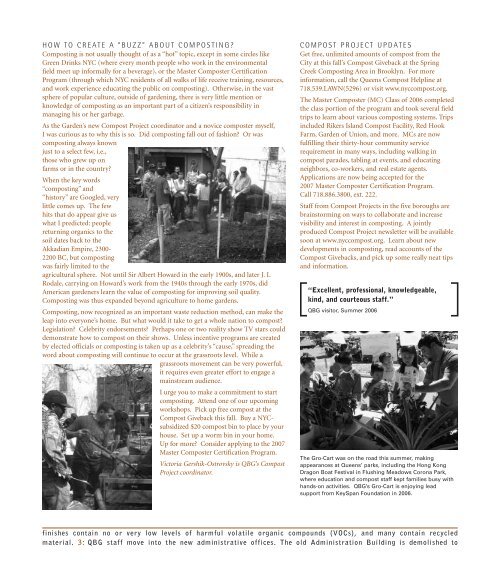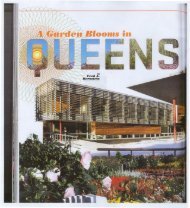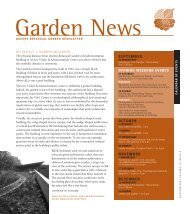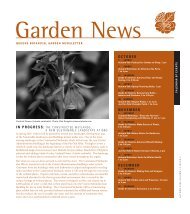EDUCATION DEPARTMENT ANNOUNCES NEW CURRICULUMWith initial phases of QBG’s Master Plan soon to be completed, the educationstaff seized the opportunity to develop new school workshop offerings for 2007with funding provided by The Louis Calder Foundation. Guided by environmentaleducation consultant Jill Weiss, they created curriculum reflecting green technologiesshowcased in the <strong>Garden</strong>’s facilities and landscapes, deciding to focus on the primaryforces driving ecosystems that are imperative for life. The resulting first unit—Round and Round It Goes— focuses on the role of water in the environment and hasbeen designed specifically for middle-school grades six, seven, and eight.Education staff chose a multi-experiential lesson plan that includes an in-school visitby QBG staff as well as two on-site class visits to the new Visitor & AdministrationBuilding and accompanying landscapes, which are models of both natural systemsand sustainable technologies. The students learn about the water cycle and its effectson the environment, observe a wetland experiment in their own classroom, andbecome stakeholders in the <strong>Garden</strong> by planting in the constructed wetlands.The bioswales, cleansing biotopes, and constructed wetlands demonstrate how naturalsystems recycle nutrients from runoff while filtering the water, remediate and preventflooding, act as buffers to prevent soil erosion, and create habitat and nursery areasfor native species. They also serve as examples of bio-mimicry—copying nature andapplying the same principles in technology (in this case by creating ecologically soundfilters for polluted water and flood prevention measures).Plants and soil on the auditorium’s green roof absorb excess water, thus relieving ouralready overburdened combined sewage system during heavy rains. The green roofalso acts as an insulator due to the water’s high specific heat capacity (the energyrequired to raise the temperature of water or the energy given off when water cools) byabsorbing massive amounts of energy from the building in the summer and giving itoff in the winter, thus lowering our reliance on fossil fuels to heat or cool the building.The building’s geothermal heating and cooling system works on a similar principle.As QBG begins to shape a sound scientific approach to environmental studies withthis pilot program, education staff hope to inspire young minds to observe and learnfrom nature. The <strong>Garden</strong>’s systems and landscapes provide unique hands-on learningopportunities that truly solidify the student’s experience. Middle-school teachersinterested in registering for Round and Round It Goes should call the educationdepartment at 718.886.3800, ext. 230. The curriculum will also be available forviewing online at www.queensbotanical.org.QBG’S NEW DOCENTS ARE WAITING FOR YOU!Congratulations to the stellar inaugural group of QBG docents who completed severalmonths of intensive training this summer. As the <strong>Garden</strong> prepares to get the wordout to the public about its remarkable workshops and environmental stewardshipinitiatives, these individuals will be essential to communicating this information tovisitors, both young and old alike, and furthering their understanding and enjoymentof QBG’s environmental and botanical resources.Currently, docents conduct tours for school groups on a pre-scheduled basis. Thesetours are designed to enhance the workshop curriculum or emphasize a specific areaof study. Docents will soon guide special interest tours, interpret seasonal events andexhibits, and conduct hands-on family craft activities for <strong>Garden</strong> visitors. They willalso offer seasonal tours to the public on a walk-in basis. These tours will provide anoverview of several popular and significant garden exhibits and an understanding ofkey concepts related to stewardship and grounds management.QBG’s new docents are Cathy Bouchard, Frances Cleary, Milagros Dichoso, DennisGolin, Gerda Kiermeier, Irving Leos, Shirley Leos, Lola McLinden, Judith Nostramo,Gabriella Oldham, Adele Scheck, Peter Schiftan, and Yolanda Silver.CompostDear FloraQ: My worm bin has been workinggreat and the worms seem happy.However, I opened the bin the otherday and saw hundreds of littlebrownish red bugs crawling on top ofthe bedding and on the underside ofthe lid. What are these creatures?Are they a problem? And, how do Iget rid of them?~ More Than WormsA: What you have is an extreme populationof mites. Mites are an important part of thedecomposer community that you havecreated in your worm bin. They eat decayingorganic matter, fungi, and other organisms.Nevertheless, mites sometimes grow to apopulation that stresses the worms. Thisoverpopulation usually occurs in a bin thatis too wet. The worms will show their stressby refusing to eat, not coming to the surface,grouping together in a ball, failing toreproduce, or trying to escape the bin.If your large population of mites begins toproduce these behaviors from your worms,there are several things you can do to get themites back to a balanced population. First,try to lower the moisture in your bin by addingdry bedding or placing the bin outdoors in thesun and leaving the top open for a short time(make sure you don’t overheat or completelydry out your bin). Second, since thepopulation of mites is often concentratedaround a specific piece of food, you canjust remove that piece of food from the bin.If there are still too many mites after thosetreatments, you can remove the top few inchesof bedding or bait the remaining mites withsome of their favorite foods: melon wedges,raw potato slices, and moistened bread.When the mites have concentrated on the bait(sometimes on the underside), you can removethe food from the bin. Place mite-covered foodor bedding in an outdoor compost bin orgarbage can.Lastly, worm bin mites and their fellowdecomposers pose no threat to humans or livingplants. I encourage you to learn more aboutthem and appreciate the work that they do!More composting questions? E-mailcompost@queensbotanical.org or call theCompost Helpline at 718.539.LAWN(5296).and water from the Visitor & Administration Building’s drains, allowing it to be reused in the water feature andfor toilet flushing. 4: Painting is completed and furniture is moved into the new building. All interior materials and
HOW TO CREATE A “BUZZ” ABOUT COMPOSTING?Composting is not usually thought of as a “hot” topic, except in some circles likeGreen Drinks NYC (where every month people who work in the environmentalfield meet up informally for a beverage), or the Master Composter CertificationProgram (through which NYC residents of all walks of life receive training, resources,and work experience educating the public on composting). Otherwise, in the vastsphere of popular culture, outside of gardening, there is very little mention orknowledge of composting as an important part of a citizen’s responsibility inmanaging his or her garbage.As the <strong>Garden</strong>’s new Compost Project coordinator and a novice composter myself,I was curious as to why this is so. Did composting fall out of fashion? Or wascomposting always knownjust to a select few, i.e.,those who grew up onfarms or in the country?When the key words“composting” and“history” are Googled, verylittle comes up. The fewhits that do appear give uswhat I predicted: peoplereturning organics to thesoil dates back to theAkkadian Empire, 2300-2200 BC, but compostingwas fairly limited to theagricultural sphere. Not until Sir Albert Howard in the early 1900s, and later J. I.Rodale, carrying on Howard’s work from the 1940s through the early 1970s, didAmerican gardeners learn the value of composting for improving soil quality.Composting was thus expanded beyond agriculture to home gardens.Composting, now recognized as an important waste reduction method, can make theleap into everyone’s home. But what would it take to get a whole nation to compost?Legislation? Celebrity endorsements? Perhaps one or two reality show TV stars coulddemonstrate how to compost on their shows. Unless incentive programs are createdby elected officials or composting is taken up as a celebrity’s “cause,” spreading theword about composting will continue to occur at the grassroots level. While agrassroots movement can be very powerful,it requires even greater effort to engage amainstream audience.I urge you to make a commitment to startcomposting. Attend one of our upcomingworkshops. Pick up free compost at theCompost Giveback this fall. Buy a NYCsubsidized$20 compost bin to place by yourhouse. Set up a worm bin in your home.Up for more? Consider applying to the 2007Master Composter Certification Program.Victoria Gershik-Ostrovsky is QBG’s CompostProject coordinator.COMPOST PROJECT UPDATESGet free, unlimited amounts of compost from theCity at this fall’s Compost Giveback at the SpringCreek Composting Area in Brooklyn. For moreinformation, call the <strong>Queens</strong> Compost Helpline at718.539.LAWN(5296) or visit www.nyccompost.org.The Master Composter (MC) Class of <strong>2006</strong> completedthe class portion of the program and took several fieldtrips to learn about various composting systems. Tripsincluded Rikers Island Compost Facility, Red HookFarm, <strong>Garden</strong> of Union, and more. MCs are nowfulfilling their thirty-hour community servicerequirement in many ways, including walking incompost parades, tabling at events, and educatingneighbors, co-workers, and real estate agents.Applications are now being accepted for the2007 Master Composter Certification Program.Call 718.886.3800, ext. 222.Staff from Compost Projects in the five boroughs arebrainstorming on ways to collaborate and increasevisibility and interest in composting. A jointlyproduced Compost Project newsletter will be availablesoon at www.nyccompost.org. Learn about newdevelopments in composting, read accounts of theCompost Givebacks, and pick up some really neat tipsand information.“Excellent, professional, knowledgeable,kind, and courteous staff.”QBG visitor, Summer <strong>2006</strong>The Gro-Cart was on the road this summer, makingappearances at <strong>Queens</strong>’ parks, including the Hong KongDragon Boat Festival in Flushing Meadows Corona Park,where education and compost staff kept families busy withhands-on activities. QBG’s Gro-Cart is enjoying leadsupport from KeySpan Foundation in <strong>2006</strong>.finishes contain no or very low levels of harmful volatile organic compounds (VOCs), and many contain recycledmaterial. 3: QBG staff move into the new administrative offices. The old Administration Building is demolished to








